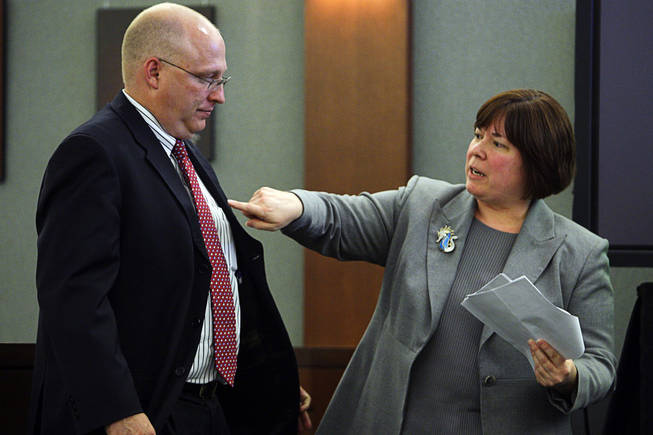
Dr. Alane Olson, a medical examiner for the coroner’s office, right, uses Chief Deputy District Attorney Christopher Laurent to describe gunshots suffered by Erik Scott during a coroner’s inquest at the Regional Justice Center Wednesday, September 22, 2010.
Published Wednesday, Sept. 22, 2010 | 10:41 a.m.
Updated Wednesday, Sept. 22, 2010 | 6:26 p.m.
Sun Archives
- Family critical of process as inquest into police shooting set to start (9-16-2010)
- Attorney for family in police shooting calls inquest process ‘a farce’ (9-16-2010)
- Attorney in Erik Scott case sends letter to judge over evidence (9-16-2010)
- Erik Scott’s family asks to view evidence before inquest (9-9-2010)
- Inquest into police shooting to be broadcast on cable TV (9-7-2010)
- Inquest set for Sept. 22 in police Costco shooting (8-12-2010)
- Metro mails Costco customers to find witnesses in police shooting (8-18-2010)
- Candlelight vigil held in memory of man killed by Metro Police (8-11-2010)
- Planning for a situation like recent Costco shooting not easy for police (7-19-2010)
- Man killed by police in Costco shooting honored at memorial (7-17-2010)
- Metro IDs officers in fatal shooting at Summerlin Costco (7-12-2010)
- Officers fatally shoot armed man at Summerlin Costco (7-10-10)
6:06 p.m.
After about seven hours of testimony, the coroner's inquest into the July 10 police shooting of Erik Scott at Costco is finished for the day.
The jury heard from several physicians who treated Scott for pain, including some who prescribed narcotic pain medication for him, which included a high level of morphine and Hydrocodone.
The final witness of the day was Colleen Kullberg, a Costco employee who saw the shooting.
Justice of the Peace Abbatangelo said the inquest will reconvene at 9 a.m. Thursday at the Regional Justice Center in downtown Las Vegas.
5:46 p.m.
Colleen Kullberg, who was working part-time at customer demonstrations at Costco, told jurors she saw Erik Scott pull out his gun and point it at a Metro officer before officers shot him.
Kullberg said as she tried to leave the store, she saw Erik Scott staring at an officer after the officer had told him to get down on the ground "at least five times."
"He reached behind him and pulled out his gun and aimed it at the officer," Kullberg said. "At that time, the officer shot him."
Asked to describe what Scott did as he was standing, staring at the officer. "He was like dazed. He was just looking at him. He wasn't obeying any of his commands."
5:36 p.m.
The coroner's inquest in Erik Scott's shooting death took a 10-minute recess at about 5:10 p.m.
The recess followed about 40 minutes of testimony from one of Scott's physicians, Dr. Joseph Gnoyski.
After Gnoyski said Scott didn't appear to be a drug seeker and mainly took prescription drugs to deal with pain, Chief District Attorney Christopher Laurent began cross-examining him.
Laurent pointedly asked if Gnoyski knew if Scott was getting additional morphine from any other source. The doctor said he didn't know.
Gnoyski said Scott had a physiological dependency, but that wasn't the same as an addiction, which also involves a psychological dependency, he said.
Gnoyski said over a period of time, Scott began to get better and that his pain level shrunk from a "10 out of 10" to a "two out of 10" on a pain scale.
Laurent asked him if the dosage of morphine that Scott had been taking could have caused him to misunderstand directions.
Gnoyski said Scott should have been able to follow directions even at that level of morphine.
Laurent also pointed out that Gnoyski had drafted a letter that was going to cut Scott off as a patient after he became worried about Scott appearing groggy following a casual visit Scott had made to his clinic.
Gnoyski said he changed his mind and didn't send the letter. He decided to have Scott come back into the office for treatment and reduce the amounts of Hydrocone he was taking and, eventually, the amount of morphine.
5 p.m.
Dr. Joseph Gnoyski, who treated Erik Scott for pain, testified he didn't think Scott was a drug seeker.
"This guy works out every day. It's not like he is seeking a buzz just to lie around," Gnoyski said. "... I don't believe this man was trying to get a buzz ... It just doesn't mesh with his character."
He said Scott was a high-level athletic performer, similar to an acrobat who might be in a Cirque du Soleil show on the Las Vegas Strip.
"I have a lot of respect for him," Scott said.
Gnoyski said there is a difference between someone who is an addict and someone who seems to be an addict who needs it for pain. But someone who seems to be an addict will begin to cut back on their medication once they begin to manage that pain.
Gnoyski said when he saw Scott act in a groggy manner, "it wasn't like he was out of control, that he was going crazy."
4:15 p.m.
The next witness in the coroner's inquest into the Metro Police shooting death of Erik Scott is Dr. Joseph Gnoyski, whose specialty is taking care of people with pain problems and debility. Gnoyski said he began seeing Erik Scott for his lower back pain.
He said Scott told him he had a paratrooping accident and a football accident, followed by a more recent automobile accident, in February. Gnoyski said Scott described his pain as a "10 out of 10" after the auto accident and said he couldn't function.
Gnoyski said he ordered an MRI for Scott and found Scott had an unstable spine. Gnoyski said Scott didn't want surgery and described him as being very physically fit.
Gnoyski said he saw Scott seven times. Initially, he didn't follow the treatment, Gnoyski said, but midway through the treatment, Scott eventually became compliant with the treatment.
Gnoyski said Scott's final visit with him was an informal visit in a hallway. Scott seemed to be groggy and had stumbled a couple of times, the doctor said.
"After 40 to 50 paces he regained his composure. I had thought he might not have used his meds appropriately," Gnoyski said. "My last dealing was to try to get him into my office."
Before Gnoyski testified, the jury heard about 45 minutes of testimony from Dr. Daniel Kim, whose specialty is pain management. Kim said he began treating Scott on Feb. 2, 2010, for chronic abdominal pain.
Kim said he prescribed medication for Scott that should have taken care of his pain. But about two weeks later, Scott contacted Kim to say he was out of medication.
"He doubled up everything that I gave to him," Kim said.
Kim said he terminated Scott from his clinic and referred Scott to a list of detoxification centers.
"He has an addiction problem to Hydrocodone," Kim said.
Kim said it was possible for people to be addicted to a narcotic substance and still do their jobs. He said about 5 to 10 percent of people who come to pain clinics might be addicted to their pain medications.
Asked if he thought his interactions with Scott led him to being shot by Metro police officers, Kim hesitated.
"That is a very philosophical question," Kim said. "Maybe I should have been more forceful and more demanding for him to go to detoxification center. I don't know."
3:26 p.m.
Dr. Daniel Kim, whose specialty is pain management, testified he believes Scott was addicted to Hydrocodone.
Kim began treating Scott on Feb. 2 this year for chronic abdominal pain. Kim is the third witness in the coroner's inquest.
"Sometimes it is almost impossible to detect who is and who isn't an addict," Kim later testified.
3:10 p.m.
Kim followed about 45 minutes of testimony from one of Scott's other physicians, Dr. Shari Klein.
Klein said she treated Scott for about two years, up until about 10 months before he was shot.
She told the jury that during that time he tried to get her to prescribe Hydrocodone, a narcotic painkiller that he told her he wanted for depression.
However, she said she never prescribed that medication for him, even though he told her she could use the excuse that he had lower back pain and shoulder pain.
She said she tried to get him to come in for a consultation, but he decided to drop her as his doctor in August 2009 for financial reasons.
She said she never prescribed morphine or any other narcotic.
2:28 p.m.
The coroner's inquest into the Metro Police shooting death of Erik Scott has resumed after taking about an hour lunch break.
The second witness testifying today is Dr. Shari Klein, of Las Vegas, who has been practicing medicine for about 10 years. Klein treated Erik Scott for two years.
Klein said Scott was her patient until August 2009. He didn't come in after that time, she said.
He told her he couldn't continue going to her because of financial reasons. She had gone into a "concierge" practice, which costs more than a regular physician's visit, she said.
Scott family attorney Ross Goodman again raised an objection while in the audience and was admonished by Judge Abbatangelo.
1:42 p.m.
The coroner's inquest in the shooting death of Erik Scott by Metro Police officers is taking a lunch break until 2 p.m.
The judge, Tony Abbatangelo, took the break after the jury heard about an hour's worth of questions put to Dr. Alane Oslon, the medical examiner who did the autopsy on Scott.
She explained that she ruled Scott's death a homicide resulting from multiple gunshot wounds.
She said there were two gunshot wounds that entered the front of his body and five that entered the rear, including one that entered his buttocks area and traveled up through his pelvic region.
Two of the shots hit his heart, she said. None of the shots was immediately lethal, she said.
She also spent several minutes describing the amount of drugs and the type of drugs that Scott had in his body, which included what she said normally would be lethal levels of morphine and Zanax.
However, she did say it was possible he could have become "habituated" to those amounts over a period of time, which would allow him to function normally.
She said the depressants found in his body also could have slowed his functions, similarly to someone who had been using alcohol.
After the judge and attorneys asked questions, the judge read 25 questions that were posed by interested parties in the courtroom, which included Scott's family and his attorney.
Some 50 witnesses are expected to testify during the inquest, which is expected to last through the end of Friday, and possibly another day, Abbatangelo said.
1:22 p.m.
The coroner's inquest broke for lunch at about 1:15 p.m. after questioning of Dr. Olson concluded.
Olson testified the official cause of death for Erik Scott to be multiple gunshots. The manner of death was classified as a homicide, although classifying a death a homicide doesn't connote whether it was criminal -- it only means it was the killing of one person by another.
She said the high amount of drugs in Scott's system was potentially lethal. She also said it was possible he was accustomed to that high level of drugs.
The morphine and Xanax both were at potentially lethal levels, which she said indicated Scott had built up a tolerance over time.
12:25 p.m.
Dr. Alane Olson, a medical examiner at the Clark County Coroner's office, was the first witness in today's coroner's inquest into the shooting death of Erik Scott.
Olson was giving a detailed explanation of the seven bullets that struck Eric Scott based off her July 11 autopsy.
She said five of the shots entered his back and two entered the front of his body. One of the bullets entered his buttocks area, traveled up through his bowels and lodged in his chest.
She said it was "indeterminate" how close Scott was from the gun barrels.
She said he also had some minor scrapes on his hands and his right knee. He also had wounds associated with attempts of medical personnel to give him aid, she said.
She was being inteviewed by Chief Deputy District Attorney Christopher Laurent, who was asking her about the toxicology report, which outlined the drugs Scott had in his body at the time of death.
12:01 p.m.
The seven jurors and four alternatives have been selected.
The judge, Abbatangelo, was giving them instructions, which included not talking about the case outside of the courtroom, or reading or listening any media reports on the case.
He said the jurors will not be sequestered.
He said the district attorney will call a witness and ask questions, then the judge will ask questions, then the jurors may ask questions. Abbantangelo said he will also receive written questions from the public and will decide if they can be asked.
11:54 a.m.
Chief Deputy District Attorney Christopher Laurent and Owens continued asking prospective jurors questions, particularly about what they felt about people who use drugs.
"We're trying to avoid prejudice against him for drug use," Owens said.
The judge, Abbatangelo, excused one juror because of a prejudice against someone who had used drugs.
11:38 a.m.
The juror selection process was continuing as the judge and the district attorney continued asking each juror questions.
The judge, Tony Abbatangelo, has now excused a total of five jurors. He said he was searching for an "open-minded" panel.
One was excused because she was a Metro employee. Another because of ties to the coroner's office. Two were excused because family members had felony convictions. One was excused for hardship.
Attorney Ross Goodman objected to the excusal of one of the jurors and was admonished by the judge for addressing the court. According to county code, the victim's family and their representatives are only allowed to submit written questions.
Earlier, as Assistant District Attorney Chris Owens gave his overview, he explained that a controversial video that showed the shooting had been damaged and that some of the witnesses called would be brought in to explain how there was an attempt made to recover the video from a hard drive.
Owens said witnesses included eyewitnesses at the scene and also witnesses who came forward later after being solicited by investigators. He said some of them live out of state.
He also said jurors would be asked to determine if the shooting was justifiable, excusable or criminal. He said "excusable" should be the verdict if they thought the shooting was accidental. He said "justifiable" should be arrived at if they determined the shooting was in self defense or in defense of someone else.
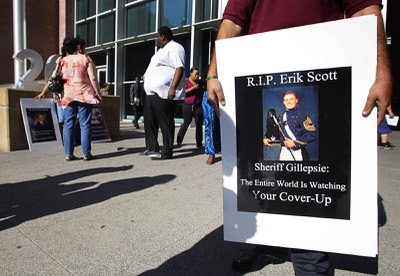
Dustin Deguevara holds a sign in front of the Regional Justice Center before a coroner's inquest into the shooting of Erik Scott Wednesday, September 22, 2010. Scott was shot and killed by Metro Police Officers at the Summerlin Costco on July 10. Deguevara said he is best friends with Erik's younger brother.
11:25 a.m.
The inquest is now in its initial stage and the seven jurors and four alternates were being selected.
Justice of the Peace Tony Abbatangelo was questioning the jurors to make sure they would be able to judge the case fairly. He excused two of them.
Abbatangelo began the proceedings about 10:50 a.m. by giving an overview of the process and introduced his court officers and Mike Murphy, the coroner.
Some 50 witnesses are expected to be called, said Assistant District Attorney Chris Owens in giving jurors his own overview of the case.
Owens said he hoped the inquest could be finished by the end of the day Friday, but the case might spill over into another day, he said.
11:08 a.m.
Las Vegas Justice of the Peace Tony Abbatangelo, who is presiding over the inquest, gave an overview of the inquest process.
Also expected to testify this morning is Shai Lierley, the security officer at Costco who called 911 to report a man was acting erratically, destroying merchandise and was possibly high on an unknown substance, said Assistant District Attorney Chris Owens in giving jurors an overview of the case.
Owens also said 911 calls and some video will be played. He told jurors several experts would testify about the efforts that were made to recover data from a failed Costco computer hard drive, which was recording the video camera pointed at the door.
A call to repair the drive had been placed several days before the shooting, he said.
10:48 a.m.
The potential jurors in the case are expected to be brought to the courtroom soon to go through the voir dire process for the coroner's inquest.
Seven jurors and two alternates will be selected to hear the case, which is expected to last several days.
The tentative witness list of those who are expected to testify includes 22 people.
As the courtroom was waiting for the proceeding to begin, Clark County Coroner Mike Murphy arrived.
A jury list was presented to the media. The first witness called will be Dr. Alane Olson, a medical examiner for the coroner's office.
10:22 a.m.
Proceedings were expected to get under way this morning for a coroner’s inquest into the death of 38-year-old Erik Scott, shot by Metro Police officers July 10 at a Summerlin Costco.
By 10 a.m., the Scott family and their attorney, Ross Goodman, had arrived in the 16th floor courtroom at the Regional Justice Center in downtown Las Vegas.
Erik Scott's parents, Bill and Linda Scott and his younger brother, Kevin Scott, were wearing buttons with a photo of Erik Scott.
Seating in the courtroom was limited to 40 people, including the media, and another courtroom was set up on the first floor for an overflow. That courtroom has about 20 people in it, who are watching the proceedings on a TV screen.
Several members of the public were lingering outside the courtroom, hoping to get seats.
The family of Scott, a West Point and Duke University graduate with a concealed weapon permit, has denied Metro’s version of events and has been openly critical of the inquest process.
Metro has identified the three officers involved as William Mosher, 38, who has been with the department since June 2005; Joshua Stark, 28, with the department since September 2008; and Thomas Mendiola, 23, with the department since March 2009.
The men have been on paid administrative leave since the shooting, in accordance with department policy. All three are patrol officers assigned to the Northwest Area Command.
A jury of seven will determine whether the officers’ actions were justified, excusable or criminal. Coroner’s juries do not have to be unanimous in reaching their decisions.
The inquest will be broadcast live on the Clark County cable television station, Channel 4.

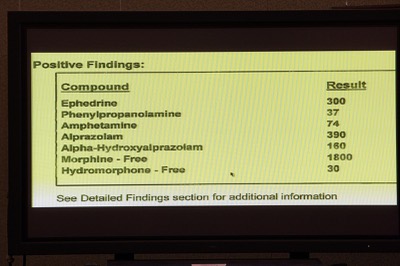
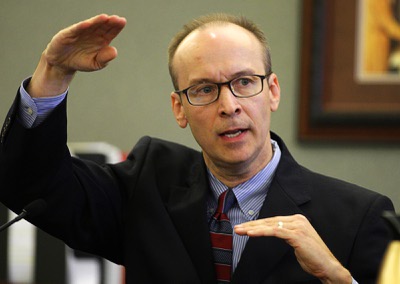
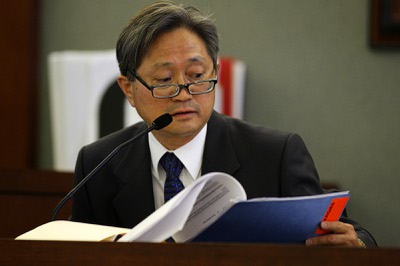
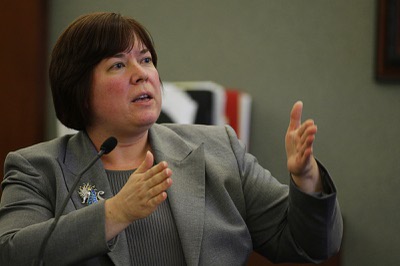
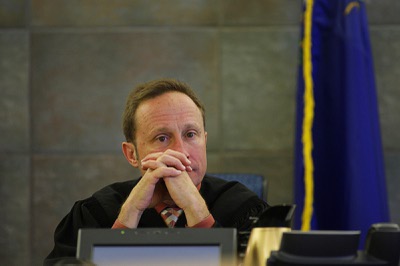
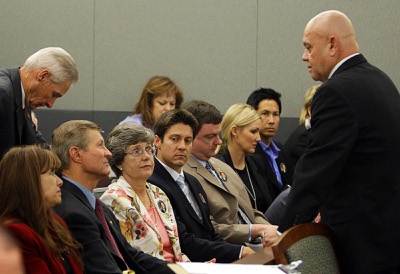


Join the Discussion:
Check this out for a full explanation of our conversion to the LiveFyre commenting system and instructions on how to sign up for an account.
Full comments policy